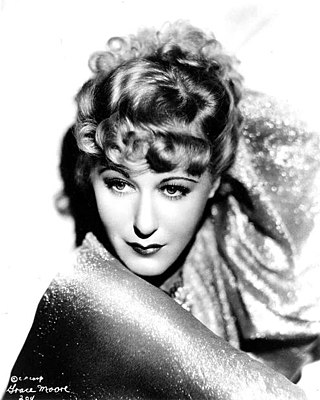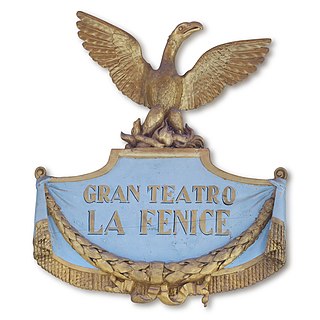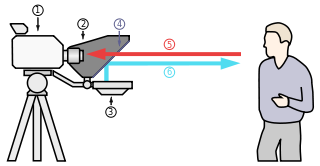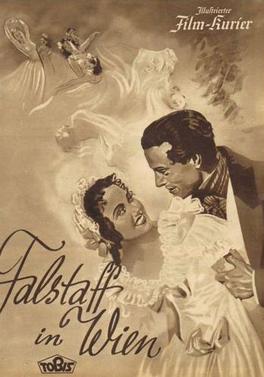
Mary Willie Grace Moore was an American operatic lyric soprano and actress in musical theatre and film. She was nicknamed the "Tennessee Nightingale." Her films helped to popularize opera by bringing it to a larger audience. She was nominated for the Academy Award for Best Actress for her performance in One Night of Love.

The Metropolitan Opera is an American opera company based in New York City, currently resident at the Metropolitan Opera House at Lincoln Center, situated on the Upper West Side of Manhattan. The company is operated by the non-profit Metropolitan Opera Association, with Peter Gelb as the general manager. The company's music director has been Yannick Nézet-Séguin since 2018.

Teatro La Fenice is a historic opera house in Venice, Italy. It is one of "the most famous and renowned landmarks in the history of Italian theatre" and in the history of opera as a whole. Especially in the 19th century, La Fenice became the site of many famous operatic premieres at which the works of several of the four major bel canto era composers—Rossini, Bellini, Donizetti, and Verdi—were performed.

A teleprompter, also known as an autocue, is a display device that prompts the person speaking with an electronic visual text of a speech or script.

The Real Teatro di San Carlo, as originally named by the Bourbon monarchy but today known simply as the Teatro (di) San Carlo, is a historic opera house in Naples, Italy, connected to the Royal Palace and adjacent to the Piazza del Plebiscito. It is the oldest continuously active venue for opera in the world, having opened in 1737, decades before either Milan's La Scala or Venice's La Fenice.

Teatro Regio di Parma, originally constructed as the Nuovo Teatro Ducale, is an opera house and opera company in Parma, Italy.

Maestro is an honorific title of respect. The term is most commonly used in the context of Western classical music and opera, in line with the ubiquitous use of Italian musical terms.

In a theatre, the prompt corner or prompt box is the place where the prompter—usually the stage manager in the US or deputy stage manager in the UK—stands in order to coordinate the performance and to remind performers of their lines when required. It is traditionally located at stage left.

In theatre and performing arts, the stage is a designated space for the performance of productions. The stage serves as a space for actors or performers and a focal point for the audience. As an architectural feature, the stage may consist of a platform or series of platforms. In some cases, these may be temporary or adjustable but in theaters and other buildings devoted to such productions, the stage is often a permanent feature.

Italian opera is both the art of opera in Italy and opera in the Italian language. Opera was in Italy around the year 1600 and Italian opera has continued to play a dominant role in the history of the form until the present day. Many famous operas in Italian were written by foreign composers, including Handel, Gluck and Mozart. Works by native Italian composers of the 19th and early 20th centuries, such as Rossini, Bellini, Donizetti, Verdi and Puccini, are amongst the most famous operas ever written and today are performed in opera houses across the world.

A theater, theatre, or playhouse, is a structure where theatrical works, performing arts, and musical concerts are presented. The theater building serves to define the performance and audience spaces. The facility usually is organized to provide support areas for performers, the technical crew and the audience members, as well as the stage where the performance takes place.

Phantom of the Opera is a musical with lyrics and a book by Ken Hill. It is based on the 1910 novel The Phantom of the Opera by Gaston Leroux. Hill wrote the original lyrics to the music of Giuseppe Verdi, Charles Gounod, Jacques Offenbach, Wolfgang Amadeus Mozart, Carl Maria von Weber, Gaetano Donizetti, and Arrigo Boito. It premiered in Lancaster, Lancashire, England, in 1976, and had a West End production in 1991. and further international productions

Radamisto is an opera seria in three acts by George Frideric Handel to an Italian libretto by Nicola Francesco Haym, based on L'amor tirannico, o Zenobia by Domenico Lalli and Zenobia by Matteo Noris. It was Handel's first opera for the Royal Academy of Music. The opera's plot is loosely based on incidents from Tacitus's Annals of Imperial Rome.
Bel canto —with several similar constructions —is a term with several meanings that relate to Italian singing.
The prompt book, also called transcript, the bible or sometimes simply "the book," is the copy of a production script that contains the information necessary to create a theatrical production from the ground up. It is a compilation of all blocking, business, light, speech and sound cues, lists of properties, drawings of the set, contact information for the cast and crew, and any other relevant information that might be necessary to help the production run smoothly.

The Mapleson Cylinders are a group of about 140 phonograph cylinders recorded live at the Metropolitan Opera House, primarily between 1901 and 1903, by the Met librarian Lionel Mapleson.

Falstaff in Vienna is a 1940 German musical comedy film directed by Leopold Hainisch and starring Hans Nielsen, Gusti Wolf and Paul Hörbiger. It portrays the life of the nineteenth century composer Otto Nicolai, known for works such as The Merry Wives of Windsor.














